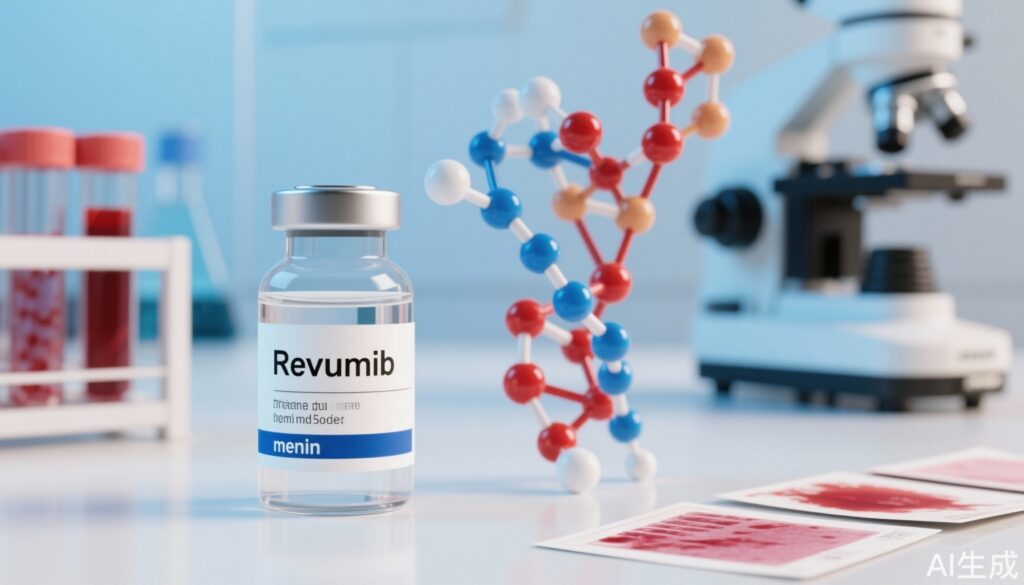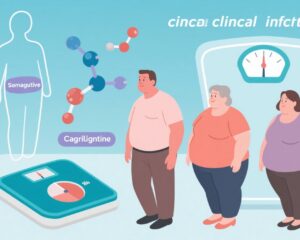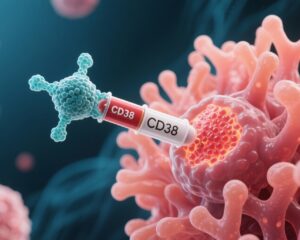Highlight
– Revumenib, a selective menin inhibitor, shows a 23.4% complete remission/CRh rate in relapsed or refractory NPM1-mutated AML.
– Overall response rate reaches 46.9%, with remissions durable for median 4.7 months.
– Treatment allows subsequent hematopoietic stem cell transplantation in some responders.
– Safety profile is manageable with low treatment discontinuation due to adverse events.
Study Background and Disease Burden
Acute myeloid leukemia (AML) harboring mutations in nucleophosmin 1 (NPM1) constitutes a frequent subtype, often associated with a distinct clinical and molecular profile. While initial responses to standard therapies can be achieved, the prognosis for patients with relapsed or refractory (R/R) NPM1-mutated (NPM1m) AML remains poor. Due to disease aggressiveness, resistance to salvage therapies, and comorbidities in older patients, effective treatment options are limited, highlighting a pressing unmet medical need.
The fusion of the menin protein with histone modifiers has been implicated in leukemogenesis, particularly in AML with KMT2A (also known as MLL) rearrangements and NPM1 mutations. Menin acts as an essential cofactor that promotes leukemic gene expression programs. Therefore, targeting menin represents a promising therapeutic strategy capable of disrupting the leukemic phenotype intrinsic to these molecular subtypes of AML.
Study Design
The AUGMENT-101 study is a phase 1/2 clinical trial evaluating the safety, efficacy, and pharmacodynamics of revumenib, a potent and selective menin inhibitor, in patients with R/R acute leukemia characterized by KMT2A rearrangements or NPM1 mutations. The current analysis focuses on the phase 2 cohort comprising patients with R/R NPM1m AML.
Eligible patients received oral revumenib every 12 hours in 28-day cycles. Dosing adjustments were permitted based on concomitant use of strong cytochrome P450 3A4 (CYP3A4) inhibitors which affect drug metabolism. The primary endpoints were the rate of complete remission (CR) or CR with partial hematologic recovery (CRh), safety, and tolerability. Secondary endpoints included overall response rate (ORR) and duration of response (DOR).
As of the data cutoff date, 84 patients had received at least one dose of revumenib, with a median age of 63 years. The primary efficacy-evaluable population in the phase 2 analysis consisted of 64 adults, 35.9% of whom had undergone three or more prior lines of therapy, and 75.0% had previously received venetoclax-containing regimens, reflecting a heavily pretreated population.
Key Findings
The combined CR + CRh rate in the efficacy-evaluable population was 23.4% (one-sided P = .0014), signifying a statistically significant and clinically meaningful response in a difficult-to-treat group. The overall response rate was 46.9%, indicating additional partial remissions and hematologic improvements beyond complete responses. The median duration of CR + CRh was 4.7 months, demonstrating sustained benefit in responders.
Of the 30 responders, 5 patients (16.7%) proceeded to hematopoietic stem cell transplant (HSCT), a potentially curative option. Notably, 3 patients resumed revumenib therapy after transplantation, suggesting tolerable long-term management. Treatment-related adverse events leading to discontinuation were infrequent (4.8%), illustrating a manageable safety profile. The documented side effects were consistent with prior observations in the KMT2A-rearranged leukemia cohorts.
The study’s data underscore that revumenib evokes meaningful clinical responses even in older, heavily pretreated patients with limited alternatives. The molecular targeting of menin interrupts leukemogenic pathways specific to NPM1-mutated AML, offering a novel mechanism distinct from cytotoxic chemotherapy and BCL-2 inhibition.
Expert Commentary
Menin inhibition has emerged as an innovative therapeutic avenue in AML, reshaping perspectives on treatment for molecularly defined subsets. Revumenib’s efficacy in NPM1m AML expands its clinical utility beyond KMT2A rearrangements, underscoring the shared dependency of these leukemias on menin-mediated epigenetic regulation.
Experts acknowledge that the AUGMENT-101 trial’s robust design, inclusion of a challenging patient demographic, and the mechanistic rationale provide strong evidence supporting revumenib’s role. However, limitations include the single-arm design and relatively modest remission duration, mandating further studies possibly in combination regimens or earlier disease settings to optimize outcomes.
From a biological perspective, the success of menin inhibition highlights the critical interplay between epigenetic modifiers and transcriptional regulation in AML pathogenesis. This lays groundwork for future explorations combining menin inhibitors with agents targeting complementary pathways for synergistic effects.
Conclusion
The phase 2 results from the AUGMENT-101 study firmly establish revumenib as a promising menin-targeted therapy for relapsed or refractory NPM1-mutated AML. The agent achieves significant remission rates with a favorable safety profile, enabling bridging to HSCT in a subset of patients. Given the substantial unmet need in this heavily pretreated population, revumenib represents a crucial advancement in tailored AML therapy.
Future research should focus on expanding indications, refining combination strategies, and identifying biomarkers predictive of response to enhance patient selection and maximize therapeutic benefit. Revumenib’s approval for KMT2A-rearranged leukemia sets a precedent for molecularly guided interventions in AML, signaling a broader shift toward precision medicine in hematologic malignancies.
References
Arellano ML, Thirman MJ, DiPersio JF, Heiblig M, Stein EM, Schuh AC, Žučenka A, de Botton S, Grove CS, Mannis GN, Papayannidis C, Perl AE, Issa GC, Aldoss I, Bajel A, Dickens DS, Kühn MWM, Mantzaris I, Raffoux E, Traer E, Amitai I, Döhner H, Greco C, Kovacsovics T, McMahon CM, Montesinos P, Pigneux A, Shami PJ, Stone RM, Wolach O, Harpel JG, Chudnovsky Y, Yu L, Bagley RG, Smith AR, Blachly JS. Menin inhibition with revumenib for NPM1-mutated relapsed or refractory acute myeloid leukemia: the AUGMENT-101 study. Blood. 2025 Aug 28;146(9):1065-1077. doi: 10.1182/blood.2025028357


